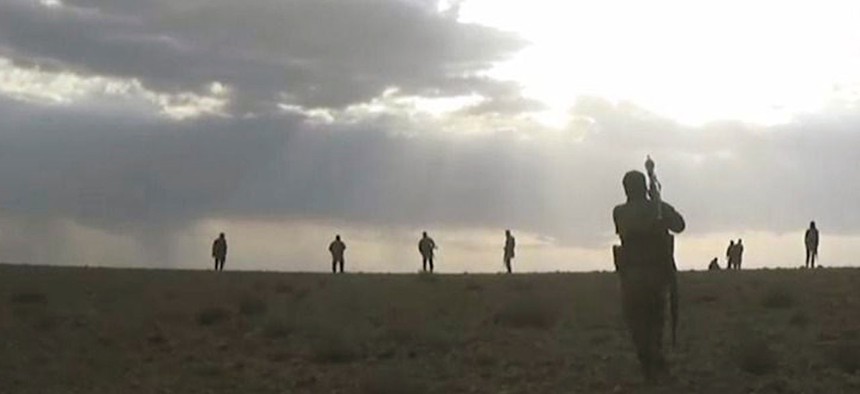
Syrian government troops take up positions in southern Syria in May. Syrian Central Military Media
U.S. Military Shoots Down 'Hostile' Drone in Syria
The move signals escalating tension in the region between U.S.-backed forces and those loyal to the Assad regime.
A U.S. fighter jet shot down an armed drone in southern Syria just after midnight local time on Tuesday, the Pentagon announced. The drone, which was made in Iran, was reportedly headed toward a U.S.-backed coalition of Syrian fighters stationed at a military camp near the Syria-Jordan border. For months, the U.S. military has been training Syrian opposition troops in the area to fight against ISIS. Tuesday’s drone strike emphasizes another escalating conflict in the region between U.S.-backed forces and those loyal to Syrian President Bashar al-Assad.
According to the U.S.-backed coalition, the drone “displayed hostile intent” as it approached their camp on Tuesday. Despite U.S. efforts to intercept the drone and make it change course, it continued to veer toward coalition troops. The incident marks the third time this month that the U.S. has shot down an aircraft affiliated with the Assad regime. On June 8, a similar drone from pro-regime forces was taken down after it dropped munitions near the U.S. military camp.
On Sunday, the U.S. also shot down a Syrian air force plane targeting U.S.-backed rebels, inciting criticism from Russia, who supports the Assad regime. The day after the incident, Russia warned that it would target “any aircraft, including planes and drones belonging to the international coalition, operating west of the Euphrates river.” The warning was enough to prompt Australia to halt its own airstrikes in Syria, which were helping the U.S. to combat ISIS.
On Monday, Russia also suspended a hotline that enabled communication with the U.S. in order to prevent unexpected confrontations in the air. The Pentagon has since claimed that the hotline remains open, with the U.S. willing to continue its use. “To be clear, we prefer to keep this channel of communication open. We want to de-escalate, not escalate,” Jeff Davis, a Pentagon spokesman, told the AP. “We remain available on our end. I’ll leave it to the Russians to state their level of participation.”
While Tuesday showed no sign of hostility between Russian and U.S. forces, the shooting down of a pro-regime drone will do little to improve relations. In the wake of the incident, Russia’s deputy foreign minister, Sergei A. Ryabkov, has accused the drone strike of “help[ing] those terrorists whom the United States fights.” And yet, as the U.S. coalition grows closer to overtaking Raqqa, an ISIS stronghold in Syria, any confrontation between U.S. and Russian forces could arguably do the same.






